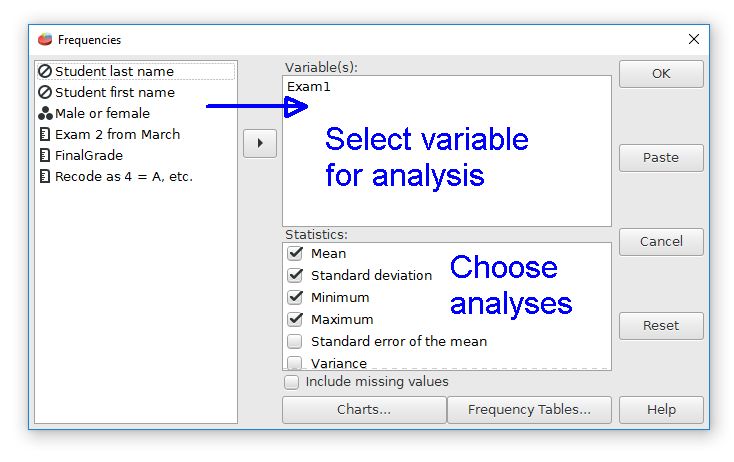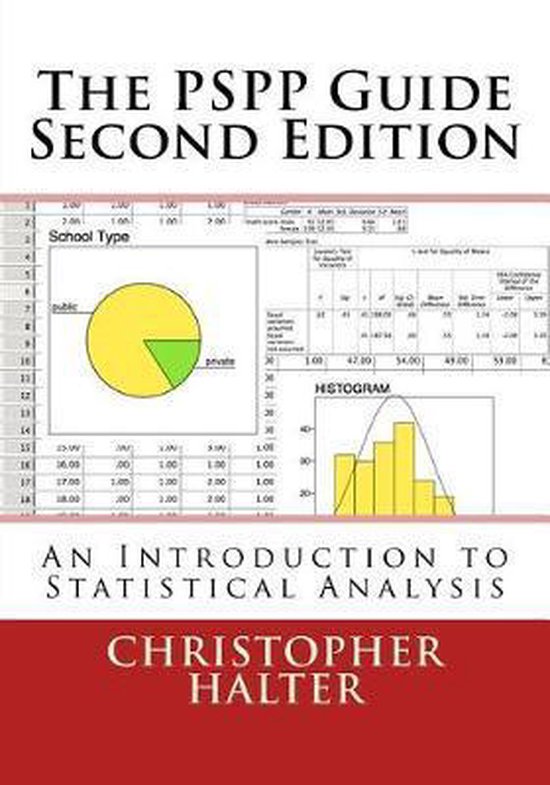PSPP
Oct 13, 2020 GNU PSPP is a program for statistical analysis of sampled data. It is a free as in freedom replacement for the proprietary program SPSS, and appears very similar to it with a few exceptions. PSPP, Free Download by Free Software Foundation, Inc. We do not have a download file for the latest version (1.4.1), but you can try downloading it from the developer's site. Descriptive statistics, including percentiles and boxplots, on PSPP. In PSPP, as in OMT, the right to democracy is invoked against measures by the ECB—an institution which by design shall be removed from influence by democratically elected officials. The Basic Law in Art. 2 provides for the transfer of central bank powers to the European Central Bank, “which is independent and committed to the.
NEW: 2020
Text file - download and save in MS Word format.
Data File - download and save in SPSS system file format. (PSPP can read this format.)
DESCRIPTION

PSPP is a statistical analysis program made available at no charge to users by the Free Software Foundation. There are two versions: the “syntax” version and the less comprehensive but more user-friendly GUI (Graphic User Interface) version. This tutorial, written primarily for beginning students, describes the GUI version.
PSPP is similar to SPSS. SPSS (officially IBM SPSS Statistics) has, through many iterations and over many years, served as a widely used standard for analyzing quantitative data. The name “SPSS” originally stood for “Statistical Package for the Social Sciences.” So successful was it, that it was widely adopted in business and other fields outside social science. Eventually it became known simply by its initials (just as many people refer to “IBM” without knowing, or caring, that these initials originally referred to “International Business Machines.”)
The authors of this tutorial have used SPSS in their teaching and research, and continue to consider it extremely useful. It has become increasingly so for undergraduate instruction as, over time, it has become much more user-friendly, so that even students with no background in statistical analysis can master it as part of a single introductory research methods or statistics course. It has also added more and more features, notably including the ability to produce a wide range of graphs.
Despite its many advantages, one thing that SPSS is not is free. As of this writing, the cost of a base subscription to SPSS starts at $99 per month! This need not trouble you if you are a student at a college or university that has purchased a site license. Even if this is not the case, you can obtain a special version available only to faculty and students at a deep discount. But still not free. (Check Amazon.com or other vendors for details.)
In this tutorial, we’ll be using a subset of the 2018 General Social Survey (GSS) for use in conjunction with the software. The GSS is a biannual national survey conducted by the National Opinion Research Center, and used for teaching and research in a variety of disciplines since 1972. We’ve created a subset of the 2018 survey. A version that can be read by PSPP can be downloaded here.
Table of Contents
Note: The manuscript is available in MS Word . You can use your browser to download it.
- Chapter 1 – Introduction
- Chapter 2 – Creating, Saving, and Opening Data Files
- Chapter 3 – Transforming Data
- Chapter 4 – Univariate Analysis
- Chapter 5 – Comparing Means
- Chapter 6 – Crosstabulation
- Chapter 7 – Correlation and Regression
- Chapter 8 – Writing Research Reports
- Appendix A – Codebook for data used in this tutorial
- Appendix B – Working with PSPP
Other Resources
For another tutorial on the Graphic User Interface (GUI) version of PSPP, see Gary Fisk, PSPP for Beginners
The Free Software Foundation, creators of PSPP, has produced a comprehensive users’guide for the command (syntax) version of PSPP. Available in various formats.
The GUI version of PSPP is perhaps most limited in its very minimal coverage of graphics, offering only pie charts, bar charts, histograms, and scatterplots, and these only with very few options. Fortunately, another package, also freely available, is Statistics Open for All (SOFA), which includes much more extensive graphics capabilities.George Self has developed a comprehensive lab manual for this package. Designed for use by his own students, he has not as yet published it on the Internet. He has, however, generously granted us permission to post it here on the site of the Cal State University Social Science Research and Instructional Center. He has copyrighted his manual under the Creative Commons “Attribution-ShareAlike 4.0 International license,” which is even more open than the “Attribution-NonCommercial-ShareAlike 3.0 license” which, except where noted, governs the rest of the SSRIC site.
About the Authors
Edited by Ed Nelson (Sociology, California State University Fresno; ednelson@csufresno.edu) and John Korey (Political Science, California State Polytechnic University, Pomona; jlkorey@cpp.edu). Ed is the primary author of Chapters 2 through 5, and Chapter 8. John is the primary author of Chapters 6 and 7.
© The Authors, 2020; Last Modified April 17, 2020.
GNU PSPP
PSPP 1.4.1 has been released.

GNU PSPP is a program for statistical analysis of sampled data. It is a free as in freedomreplacement for the proprietary program SPSS, and appears very similar to it with a few exceptions.
The most important of these exceptions are, that there are no “time bombs”; your copy of PSPP will not “expire” or deliberately stop working in the future.Neither are there any artificial limits onthe number of cases or variables which you can use. There are no additional packages to purchase in order to get “advanced” functions; all functionality that PSPP currently supports is in the core package.
PSPP is a stable and reliable application. It can perform descriptive statistics, T-tests, anova, linear and logistic regression,measures of association, cluster analysis, reliability and factor analysis, non-parametric tests and more.Its backend is designed to perform its analyses as fast as possible, regardlessof the size of the input data.You can use PSPP with its graphical interface or the more traditional syntax commands.
A brief list of some of the PSPP's features follows below.We also made available a page with screenshots and sample output.PSPP has:
- Support for over 1 billion cases.
- Support for over 1 billion variables.
- Syntax and data files which are compatible with those of SPSS.
- A choice of terminal or graphical user interface.
- A choice of text, postscript, pdf, opendocument or html output formats.
- Inter-operability with Gnumeric, LibreOffice, OpenOffice.Org and other free software.
- Easy data import from spreadsheets, text files and database sources.
- The capability to open, analyse and edit two or more datasets concurrently. They can also be merged, joined or concatenated.
- A user interface supporting all common character sets and which has been translated to multiple languages.
- Fast statistical procedures, even on very large data sets.
- No license fees.
- No expiration period.
- No unethical “end user license agreements”.
- A fully indexed user manual.
- Freedom ensured; It is licensed under the GPLv3 or later.
- Portability; Runs on many different computers and many different operating systems (GNU or GNU/Linux are the prefered platforms, but we have had many reports that it runs well on other systems too).
PSPP is particularly aimed at statisticians, social scientists and students requiring fast convenient analysis of sampled data.
Downloading PSPP
As with most GNU software, PSPP can be found on the main GNU ftp server:http://ftp.gnu.org/gnu/pspp/(via HTTP) andftp://ftp.gnu.org/gnu/pspp/(via FTP). It can also be foundon the GNU mirrors;pleaseusea mirror if possible.


There are some additional ways youcan download or otherwise obtain PSPP.
Documentation
Documentation forPSPPis available online, asis documentation for most GNU software. You mayalso find more information aboutPSPPby runninginfo pspporman pspp,or by looking at/usr/share/doc/pspp/,/usr/local/doc/pspp/,or similar directories on your system. A brief summary is available byrunning pspp --help.
A developer's manual is also available in various formats. Developers of software designed to interoperate with PSPP or SPSS will find this manual's appendices particularly valuable, because they specify the data file formats in great detail.
A manual for PSPP in French, written independently by Julie Séguéla, is alsoavailable in PDFand LaTeX formats.
A tutorial independently published by Prof. Gary Fisk may also be helpful to those first starting out with PSPP.
Further information
For further information, please browse our list offrequently asked questions to see ifyour issue is mentioned there.If it is not, you might also want to peruse the archives of our mailing list,pspp-users; the issue may have been discussed there.Failing that, you are welcome to subscribe to the list, and send a question of your own.

If you believe you have found a bug in PSPP, please report it eitherby sending a message to the mailing listbug-gnu-psppor by using the bug tracker.To privately report a security vulnerability in GNU PSPP, please sendyour report to the pspp-securitymailing list.
Announcements about PSPP are made onpspp-announceas well as (in common with most other GNU software)info-gnu.
Getting involved
Development of PSPPand GNU in general, is a volunteer effort, and you can contribute. Forinformation, please read How to help GNU. If you'dlike to get involved, it's a good idea to join the discussion mailinglist (see above).
- Test releases
- Trying the latest test release (when available) is alwaysappreciated. Test releases of PSPPcan be found athttp://alpha.gnu.org/gnu/pspp/(via HTTP) andftp://alpha.gnu.org/gnu/pspp/(via FTP).
- Reliability and accuracy of PSPP is something we take seriously.Accordingly, in addition to regular manual testing,snapshot buildsincluding automatic regression tests are typically run every day.
- Development
- For development sources, issue trackers, and otherinformation, please see thePSPPproject pageat savannah.gnu.org.
- Translating PSPP
- To translate PSPP's messages into other languages, please see the Translation Projectpage for PSPP.If you have a new translation of the message strings,or updates to the existing strings, please have the changes made in thisrepository. Only translations from this site will be incorporated intoPSPP.For more information, see the TranslationProject.
- Maintainer
- PSPP is currently being maintained by Ben Pfaff and John Darrington.Please use the mailing lists for contact.
Licensing
Www.psppreferredpet.com
PSPPis free software; you can redistribute it and/or modify it under theterms of the GNU General Public License as published by the FreeSoftware Foundation; either version 3 of the License, or (at youroption) any later version.
